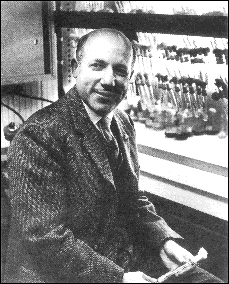Calvin, Melvin (1911–1997)

Melvin Calvin was an American biochemist at the University of California, Berkeley, who won the Nobel Prize in Chemistry (1961) for his work on photosynthesis. Using carbon-14 as a tracer, Calvin and his team mapped the complete route that carbon takes through a plant. In doing so, he showed that sunlight acts on chlorophyll to fuel the manufacture of organic compounds, rather than on carbon dioxide as had been previously believed.
In 1950, Calvin and his associates began pioneering experiments in prebiotic evolution by irradiating a solution of carbon dioxide and water vapor with ionizing radiation from a cyclotron. Simple organic chemicals, including formic acid and formaldehyde (methanal) were produced – though not amino acids as in the Miller-Urey Experiment, carried out three years later. Calvin's work on prebiotic evolution encouraged him to believe that such processes may have occurred elsewhere in the solar system and on many extrasolar worlds.
In 1958, Calvin was appointed chairman of Panel 2 on Extraterrestrial Life, assembled to consider the problems of contamination by spacecraft. It was his opinion that:
We can assert with some degree of scientific confidence that cellular life as we know it on the surface of the Earth does exist in some millions of other sites in the universe.
During the formative stages of NASA's astrobiology program, Calvin became chairman of the Space Biology Committee, and in 1961 was among the attendees at the Green Bank conference on SETI held in the wake of Project Ozma. In January 1960, he and Susan K. Vaughan announced that, during their investigation of a sample of the Murray meteorite, they had found a number of organic molecules including one that was chemically similar to cytosine. Calvin concluded that:
[A]s to whether or not there were possibly prebiotic forms out on astral bodies other than the earth, seems to be answered, at least tentatively, in the affirmative.
He received his BS from Michigan Technological University (1931) and PhD in chemistry from the University of Minnesota (1935). Following postdoctoral research at the University of Manchester, England, he joined the Chemistry Department at Berkeley in 1937. He was Director of the Chemical Biodynamics Division of the Lawrence Berkeley Laboratory (1945–1980) and Director of UC Berkeley's Laboratory of Chemical Dynamics (1963–1980).1
Reference
1. Calvin, Melvin. Chemical Evolution: Molecular Evolution Towards the Origin of Life on the Earth and Elsewhere. New York; Oxford University Press (1969).


